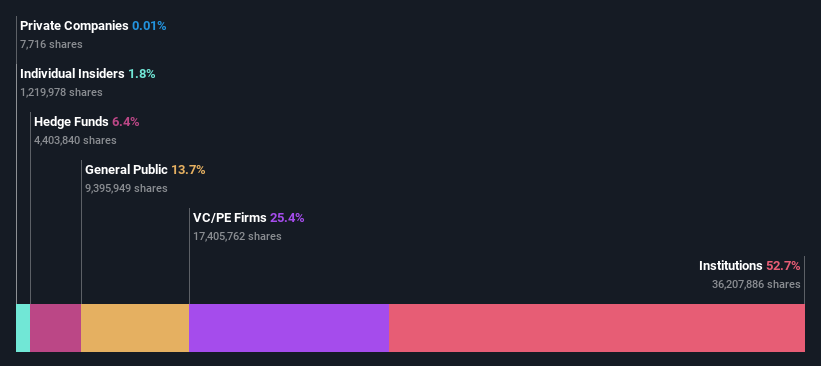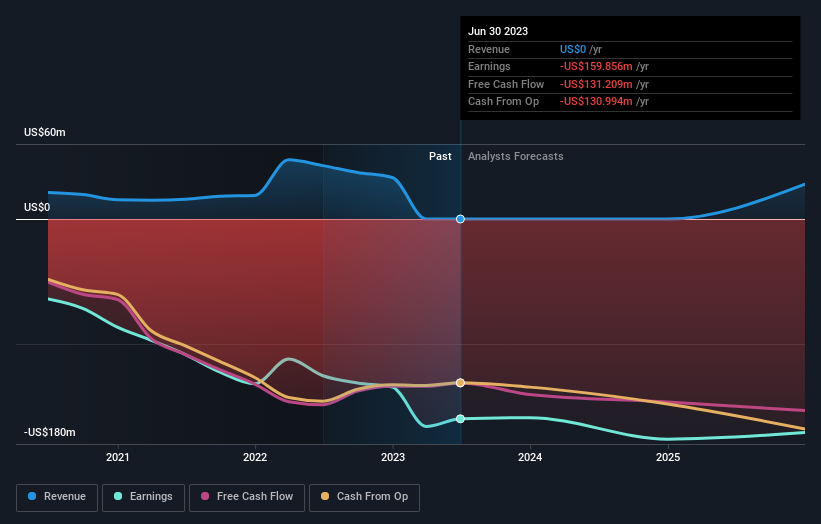Institutional investors are Scholar Rock Holding Corporation’s (NASDAQ:SRRK) biggest bettors and were rewarded after last week’s US$124m market cap gain

Key Insights
-
Institutions’ substantial holdings in Scholar Rock Holding implies that they have significant influence over the company’s share price
-
A total of 5 investors have a majority stake in the company with 52% ownership
A look at the shareholders of Scholar Rock Holding Corporation (NASDAQ:SRRK) can tell us which group is most powerful. With 53% stake, institutions possess the maximum shares in the company. In other words, the group stands to gain the most (or lose the most) from their investment into the company.
Last week’s 6.4% gain means that institutional investors were on the positive end of the spectrum even as the company has shown strong longer-term trends. The one-year return on investment is currently 12% and last week’s gain would have been more than welcomed.
In the chart below, we zoom in on the different ownership groups of Scholar Rock Holding.
View our latest analysis for Scholar Rock Holding
What Does The Institutional Ownership Tell Us About Scholar Rock Holding?
Institutional investors commonly compare their own returns to the returns of a commonly followed index. So they generally do consider buying larger companies that are included in the relevant benchmark index.
We can see that Scholar Rock Holding does have institutional investors; and they hold a good portion of the company’s stock. This suggests some credibility amongst professional investors. But we can’t rely on that fact alone since institutions make bad investments sometimes, just like everyone does. It is not uncommon to see a big share price drop if two large institutional investors try to sell out of a stock at the same time. So it is worth checking the past earnings trajectory of Scholar Rock Holding, (below). Of course, keep in mind that there are other factors to consider, too.
Since institutional investors own more than half the issued stock, the board will likely have to pay attention to their preferences. Our data indicates that hedge funds own 6.4% of Scholar Rock Holding. That’s interesting, because hedge funds can be quite active and activist. Many look for medium term catalysts that will drive the share price higher. The company’s largest shareholder is T. Rowe Price Group, Inc., with ownership of 14%. In comparison, the second and third largest shareholders hold about 13% and 11% of the stock.
To make our study more interesting, we found that the top 5 shareholders control more than half of the company which implies that this group has considerable sway over the company’s decision-making.
Researching institutional ownership is a good way to gauge and filter a stock’s expected performance. The same can be achieved by studying analyst sentiments. Quite a few analysts cover the stock, so you could look into forecast growth quite easily.
Insider Ownership Of Scholar Rock Holding
The definition of an insider can differ slightly between different countries, but members of the board of directors always count. Company management run the business, but the CEO will answer to the board, even if he or she is a member of it.
Insider ownership is positive when it signals leadership are thinking like the true owners of the company. However, high insider ownership can also give immense power to a small group within the company. This can be negative in some circumstances.
Our most recent data indicates that insiders own some shares in Scholar Rock Holding Corporation. It has a market capitalization of just US$538m, and insiders have US$9.6m worth of shares, in their own names. It is good to see some investment by insiders, but it might be worth checking if those insiders have been buying.
General Public Ownership
With a 14% ownership, the general public, mostly comprising of individual investors, have some degree of sway over Scholar Rock Holding. While this size of ownership may not be enough to sway a policy decision in their favour, they can still make a collective impact on company policies.
Private Equity Ownership
With an ownership of 25%, private equity firms are in a position to play a role in shaping corporate strategy with a focus on value creation. Some might like this, because private equity are sometimes activists who hold management accountable. But other times, private equity is selling out, having taking the company public.
Next Steps:
It’s always worth thinking about the different groups who own shares in a company. But to understand Scholar Rock Holding better, we need to consider many other factors. Take risks for example – Scholar Rock Holding has 4 warning signs (and 1 which is a bit concerning) we think you should know about.
If you would prefer discover what analysts are predicting in terms of future growth, do not miss this free report on analyst forecasts.
NB: Figures in this article are calculated using data from the last twelve months, which refer to the 12-month period ending on the last date of the month the financial statement is dated. This may not be consistent with full year annual report figures.
Have feedback on this article? Concerned about the content? Get in touch with us directly. Alternatively, email editorial-team (at) simplywallst.com.
This article by Simply Wall St is general in nature. We provide commentary based on historical data and analyst forecasts only using an unbiased methodology and our articles are not intended to be financial advice. It does not constitute a recommendation to buy or sell any stock, and does not take account of your objectives, or your financial situation. We aim to bring you long-term focused analysis driven by fundamental data. Note that our analysis may not factor in the latest price-sensitive company announcements or qualitative material. Simply Wall St has no position in any stocks mentioned.








